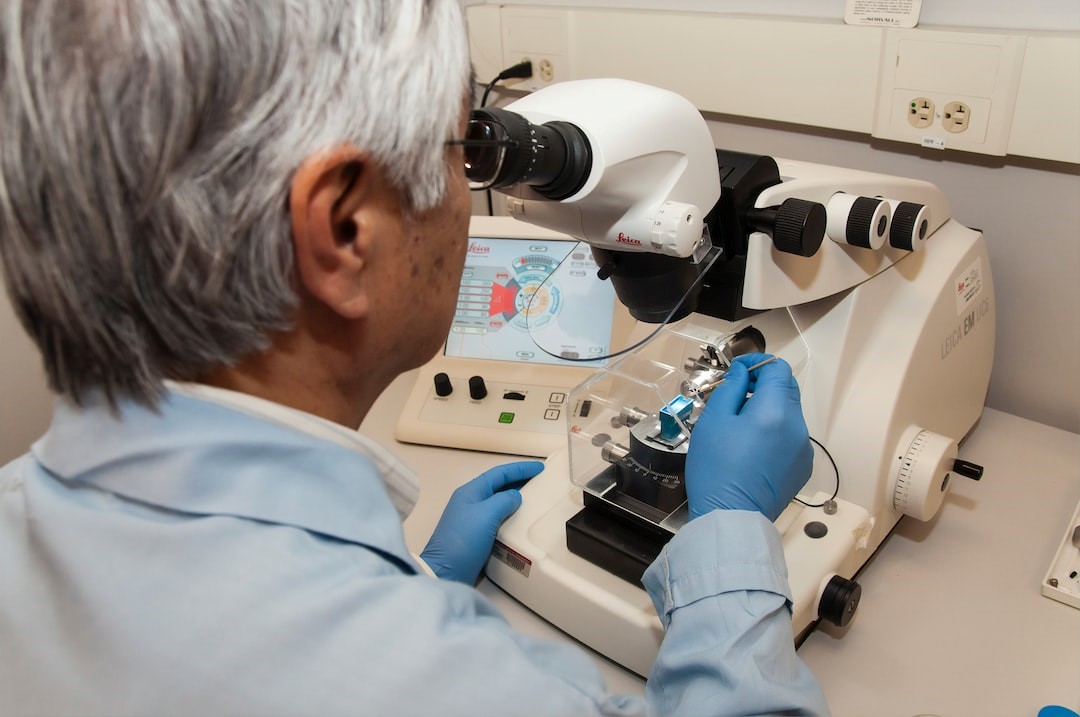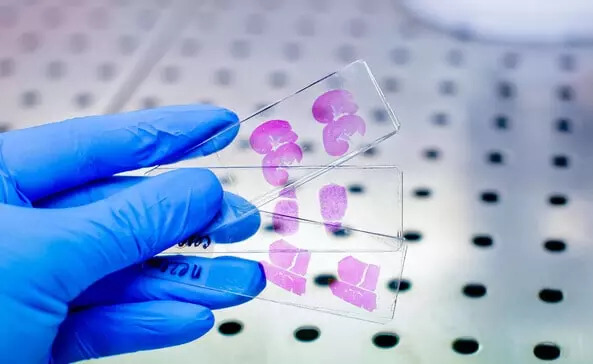immunohistochemistry test
What is Immunohistochemistry: Test, Cancer Detection, and Types
What is Immunohistochemistry? Immunohistochemistry is a powerful microscopy-based technique combining immunological, biochemical, and anatomical techniques to image and identify discrete tissue components. This process uses appropriately labelled antibodies that bind to a target antigen in situ and allows you to visualize and document the localisation and high-resolution distribution of a specific cellular component within a cell. History of Immunohistochemistry Immunochemistry is a widely used staining technique that helps doctors detect certain infectious diseases and cancers easily. While the history of immunohistochemistry has been known since the 1930s, it was only in 1941 that you can find the first immunohistochemistry study being conducted. Since then, several scientists have adapted and improved this technique multiple times and made it a standard part of diagnostic testing as it can provide specific information. Principle of Immunohistochemistry Immunohistochemistry uses antibodies to detect antigens present in the tissue or blood of the individual. An antibody is a component that binds tightly to an antigen, a foreign body, or a toxin that causes an immune reaction. Although antibodies are produced in your body, a scientist will make specific antibodies for diagnostic immunohistochemistry staining in the laboratory. In the immunohistochemistry procedure, a pathologist, i.e., a doctor who examines cells for diseases, will load a specific antibody with a dye. When this antibody binds to the antigen, it activates the dye creating the process of staining. While the first known dye to be used in 1941 was Fluorescein isothiocyanate, which helped localise pneumococcal antigens in infected tissue, extensive research and expansion in this field led to the introduction of enzyme labels like peroxidase and alkaline phosphatase. Colloidal gold is another recent discovery in the field that has been used to identify immunohistochemical reactions that can be observed under a light or electron microscope. Other types of labels used in immunochemistry include radioactive elements, which can be seen using a process called autoradiography. Process of Immunohistochemistry The immunohistochemistry procedure is divided into several steps that involve the study of the cells with and without a microscope, including: Sample Preparation The quality of the tissue sample plays a vital role in immunohistochemistry as the sample collection and preparation dictated the antigen exhibition and location. This process depends on whether you need to study cells or tissues. Adherent cells are usually grown on culture plates or chamber slides, while non-adherent called are bound to the coverslip using a chemical bond. Tissue samples are typically collected through biopsy, autopsy, surgery, and animal models. These are then thinly cut with a sharp knife or scissors to avoid extrusion damage to the cells before being fixed onto the slides. Fixation In this step, the sample is fixed onto a slide or the coverslip using solutions like acetone, alcohol, aldehyde, or non-aldehydes. This step helps to prevent postmortem changes and denaturing of the cells, which can hamper the study of these cells. Staining and Observation In the case of tissue samples, a pathologist will dip thin slices of the tissue in a staining solution, allowing them to observe and differentiate the cell types in the sample. The pathologist will then consider the type of cancer or disease suggested by initial testing and select one or more antibodies that will help give more insight into the cells present in the sample. Understanding the Results Upon completing the analysis, the pathologist will create a pathology report summarising their diagnosis along with other relevant information about the sample. The entire process takes a few days to be finalised. Diagnostic immunohistochemistry tests take longer than routine tests, and the length of time required for this process depends on the number of tests that need to be carried out, as well as the complexities of these tests. What Does Immunohistochemistry Tell Us About Cancer? Most pathologists will be able to tell you which cancer cells they see under a microscope without carrying out an immunohistochemical analysis. However, it can be challenging to identify specific types of cancers and other properties without the help of immunohistochemistry. Doctors may suggest you carry out immunochemistry tests in some instances like: Breast cancer: To know whether or not the cells have HER2 progesterone or estrogen receptors, which affects the treatment and outlook of their patient. Lymphoma: With over 90 subtypes of lymphoma, immunohistochemistry can help determine the subtype and detect any gene alterations. It can also aid doctors in understanding how much the cancer has spread in the body. Stomach cancer: Immunohistochemistry is one of the most accurate staining techniques that detect the presence of H. pylori bacteria which is the leading cause of stomach cancer globally. Prostate cancer: Immunohistochemistry helps provide greater insight and specific information about prostate cancer cells, which can dictate the outlook and treatment options for the individual diagnosed with this disease. Lung cancer: Immunohistochemistry can help distinguish between small-cell and non-small-cell lung cancer. It is also necessary to diagnose uncommon types of lung cancer or cell mutation that allow the use of live-saving immunotherapy. To Sum Up Immunohistochemistry is a popular diagnostic technique as it offers specific test results, is more cost-effective, has a quick turnaround time, and uses a wide range of samples, from fresh and frozen to paraffin-embedded ones. Although not all cancers need to be further tested with immunohistochemistry, it is very helpful in detecting some types like lymphoma or Breast cancer. Metropolis Healthcare provides quality diagnostic services, including a wide range of immunohistochemical tests. Check out the entire list of cancer-related testing options here.
IHC Test (ImmunoHistoChemistry): Purpose, Procedure and Cost
Immunohistochemistry (IHC) is a special staining process or test to detect specific molecules on the cell surface. Purpose of The IHC Test The Immunohistochemistry test is used to diagnose cancer by detecting a specific type of antibody attached to the antigen on the cell surface. The purpose of the special staining technique is to detect molecules which are usually markers specifying whether the cancer is benign or malignant. Hence, IHC meaning and its application are predominantly found in diagnosing cancer. Customers Profile for The Test The IHC test is recommended by doctors in the following cases or suits the below customer profiles: Doctors prescribe the Immunohistochemistry test to suspect the patient has either cancer or a tumour in some body part. The test helps in identifying the stage and the grade of the tumour. Also, the test is crucial in the identification of the cell type as well as the level of metastasis. The IHC test for cancer helps detect many types of cancer, like adenocarcinomas and colon, breast and prostate cancer. It even helps in detecting lymphomas and skin cancer. The IHC helps predict response to treatment in two forms of tumours: prostate and breast carcinoma. Applications or Use Cases Immunohistochemistry is an important application or technique widely used for diagnosing cancer by detecting the presence of specific tumour antigens. One of the prominent use cases of the specialised staining technique is detecting the presence of markers on cells that might lead to cancerous growth. IHC has a role in the following: Predict prognostic markers in cancer Investigate tumors of uncertain histogenesis Predicts response to therapy Confirm infectious agents in tissues Determine the function of specific gene products Subclassification and diagnosis of neurodegenerative disorders Detect axonal injury or brain trauma Specific diagnosis of muscular dystrophy IHC Test Price The IHC test cost depends on the type of test done as well as the location of conducting the test. The average price range of the test starts from Rs 6500 and might go up to Rs 8500 or even higher. The price varies depending on the city, the quality of the test, and availability. Procedure for The Immunohistochemistry Test Collection of tissue: The first step for conducting the IHC test is tissue processing, fixation, and sectioning. The technician or pathologist collects the tissue samples for the biopsy process in a non-breakable, sterilized plastic container. Tissue fixation is followed by tissue fixation, which helps preserve the antigens. Embedding tissue provides the necessary support during the sectioning process. Paraffin embedding is the most common process for preparing the tissue sections. Sample fixation helps tissue processing and prevents the degradation of antigens, cells, and tissues. Checking for reference range During this procedure, once the sample is checked and identified for markers with the help of a dye or staining agent, check for a reference range to find out whether the test is negative or positive. A negative test means that the laboratory did not find any changes in the protein or any marker on the cell. This means that either the person is not affected by the disease, is not a carrier of a specific genetic mutation, or does not increase the risk of developing cancer or related disease. A positive test means that a marker or receptor is found on the cell during the biopsy or indicates a certain change in the protein of the tumour. The positive result indicates that the person might have inherited a genetic condition. Conclusion The immunohistochemistry technique helps detect markers or receptors on cells that indicate the presence of cancerous or tumour growth. The test is quite affordable and makes use of monoclonal and polyclonal antibodies for detecting the presence of specific antigens. As the IHC test involves antigen-antibody reactions, it helps provide more accurate results than other clinical diagnostics.
 Home Visit
Home Visit Upload
Upload
















 WhatsApp
WhatsApp